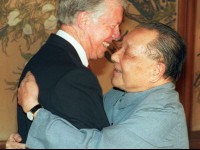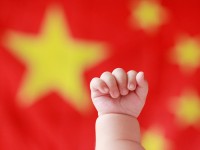Chen Jimin, Guest Researcher, Center for Peace and Development Studies, China Association for International Friendly Contact
Dec 07, 2015
The debate about unauthorized immigrants and legal immigrants has until now mostly focused on their impact on US employment and economic growth. However, after the Paris terrorist attack, the issue has evolved into a national-security issue, stirring arguments about America’s core values as a presidential election looms.
Casey Walker, Novelist, Instructor at Cooper Union in New York City
Dec 04, 2015
'Development' is often spoken of as an end-in-itself, part of an inevitable march toward progress and modernity. What happens if we pause to take stock of the recent history of this development mantra--and examine who it benefits, who it excludes, and the price China and the United States pay for 'progress'?
Robert I. Rotberg, Founding Director of Program on Intrastate Conflict, Harvard Kennedy School
Dec 02, 2015
Since the 1990’s, Sam Pa subsequently amassed a huge fortune by helping shady African autocrats sell their petroleum and minerals to China. Sam Pa was most of all a source of “rents” for several dozen corrupt politicians and officials in the resource-rich areas of Africa. However, Sam Pa’s arrest last month has put an end to his corruption.
Zhang Zhixin, Research Professor of Institute of American Studies, CICIR
Nov 24, 2015
If the ‘92 Consensus is respected, which is already the bottom line for a healthy cross-strait relationship, interactions could advance in ways benefiting both sides, which will continue to enjoy the bonus of the peace and economic cooperation. Efforts to put distance between Taipei and Beijing, whether made by domestic or outside parties, can only damage both sides of the relationship.

Ma Shikun, Senior Journalist, the People’s Daily
Nov 18, 2015
As the President of the United States while relations between the U.S. and China normalized, former President Jimmy Carter has enjoyed popularity among Chinese. However, it is his profound understanding of Chinese systems that maintains his appeal.
Zhu Songling, Professor, Beijing Union University
Nov 17, 2015
The leaders reaffirmed the fundamentally important role of the 1992 Consensus in maintaining peace and stability across the Taiwan Strait, offering a status quo of peace and development. It provides guidance to the future development of cross-Strait relations, and all parties should value that no matter who wins Taiwan’s 2016 elections.
Tom Watkins, President and CEO of the Economic Council of Palm Beach County, FL
Nov 16, 2015
The world has to respect the patience of the People's Republic of China's vision to take the long view of reuniting with Taiwan in a peaceful manner. This is not only in the best interest of the people of China and Taiwan, but all of humanity.
Huang Jiashu, Professor, Renmin University
Nov 16, 2015
The tacit accord achieved by Xi Jinping and Ma Ying-jeou reflects the leaders’ confidence and wisdom to tackle tough problems in an easy manner -- and open minds that can reach a compromise with friends. Cross-Strait relations have developed peacefully for over seven years and reached a milestone at the meeting.

Minxin Pei, Tom and Margot Pritzker ’72 Professor of Government , Claremont McKenna College
Nov 11, 2015
Minxin Pei recognizes some brutal consequences of the one-child policy, and implores for outsiders and Chinese alike to emphasize the senseless cruelty that such measures imply and work to ensure that they are never seen again.
Zhang Zhixin, Research Professor of Institute of American Studies, CICIR
Nov 05, 2015
The U.S. vice president’s formal announcement that he will not run, and a lack of any other mainstream challenge, means the former secretary of state’s path to the presidency has suddenly been made smoother.
Back to Top

- China-US Focus builds trust and understanding between the U.S. and China through open dialogue among thought leaders.
- Our Offerings
- Topics
- Videos
- Podcasts
- Columnists
- Research Reports
- Focus Digest
- Stay Connected
-
Thanks for signing up!
- Get the latest stories from China-US Focus weekly.